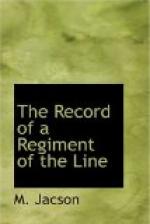BY LIEUT.-GENERAL W. KITCHENER
Experience we all know to be a valuable asset, and experience in war is the most costly of its kind. To enable those coming after us to reconstruct the picture of war, Regimental Histories have proved of infinite value. That such a record fills a sentimental want hardly requires assertion.
My first feelings on being honoured with a request from the Devonshire Regiment to write a preface to the account of their “Work in South Africa, 1899-1902,” were, I confess, How could I refuse so difficult a task gracefully? However, on further consideration it seemed to me that undoubtedly such a preface should be written by some one outside the corps itself. Onlookers, as the saying goes, often see most of the game, and, being free from personal bias, can often add something to what those engrossed in the meshes of life’s details can only appreciate from a narrower point of view.
From this standpoint, and as I was the General under whom the 1st Devons served longest in South Africa, it seemed obviously my duty to attempt the task.
The “Work of the 1st Battalion of the Devonshire Regiment” is portrayed in these pages. It therefore only remains for me to add, for the benefit of coming generations, what manner of men these were, who by their dogged devotion to duty helped to overcome the Boer. Associated as one was with many corps in the close intimacy of veldt life, it was a study of the deepest interest to note the individuality that characterized each, and which was often as clearly and as well defined as that of the men with whom one daily came in contact.
During the many months of our intimate association, and in the varied situations that presented themselves, I cannot call to mind any single occasion on which the Devons were ever flurried or even hurried. Their imperturbability of temper, even under the most trying conditions, could not be surpassed.
Another characteristic of the corps was its inherent thrift. They were, in fact, essentially a “self-help” corps. When a flood came and washed away the bridge leading to the picket line, no sapper was required to show them how to throw a suspension bridge above the flood from tree to cliff. It was characteristic of the Regiment that they carried out in war their peace training, never allowing the atmosphere of excitement to distort their actions.
If we take Elandslaagte, Wagon Hill, or any of the hundred and one ticklish night operations in which they took part, this trait will be ever noteworthy, that they acted as was to be expected of them, and made no fuss of having done so.




